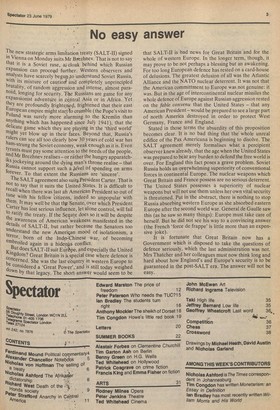No easy answer
The new strategic arms limitation treaty (SALT-II) signed in Vienna on Monday suits Mr Brezhnev. That is not to say that it is a Soviet ruse, a; cloak behind which Russian expansion can proceed further. Western observers and analysts have scarcely begun ,to understand Soviet Russia, with its mixture of cautiod and completely unprincipled brutality, of random aggression and intense, almost paranoid, longing for security. The Russians are game for any expansionist adventure in central Asia or in Africa. Yet they are profoundly t.rightenecl, frightened that their east European empire might startto crumble (the Pope's visit to Poland was surely more alarming to the Kremlin than anything which has happened since July 1941), that the delicate game which they are playing in the 'third world' might yet blow up in their faces. Beyond that, Russia's rulers can see all too clearly bow 30 years of cold war has ham-strung the Soviet economy, weak enough as it is. Even tyrants must pay some attention to the needs of the people. fldMr Brezhnev realises— or rather the hungry apparatchlks jockeying around the dying man's throne realise — that Russia cannot support such a JeVel of spending on arms forever. To that extent the Russians are 'sincere'. The SALT agreement also suit5President Carter. That is not to say that it suits the United .States. If is difficult to recall when there was last ah American President so out of tune with his fellow -citizens, indeed so unpopular with them. It may well be that op 'Senate, over which President Carter has lost serious influence, let alone control, will fail to ratify the treaty. If the Sepate does so it will be despite the awareness of American:weakness manifested in the details of SALT-II, but rather because the Senators too understand the new American mood of isolationism, a terror, born of the Indp::Chinese war, of becoming embroiled again in a hideo,Os conflict. But does SALT-II suit Etape, and especially the United Kingdom? Great Britain is a special case where defence is Foncerned. She was the lasteOuntry in western Europe to b.e considered a 'Great Power',:and Is still today weighed down by that legacy. The shott•answer would seem to be that SALT-II is bad news for Great Britain and for the whole of western Europe. In the longer term, though, it may prove to be not perhaps a blessing but an awakening. For too long European defence has rested on a card-house of delusions. The greatest delusion of all was the Atlantic Alliance and the NATO nuclear deterrent. It was not that the American committment to Europe was not genuine: it was. But in the age of intercontinental nuclear missiles the whole defence of Europe against Russian aggression rested on the fable convenu that the United States — that any American President — would be prepared to see a large part of north America destroyed in order to protect West Germany, France and England.
Stated in those terms the absurdity of this proposition becomes clear. It is no bad thing that the whole unreal edifice of the Pax Americana is beginning to disolve. The SALT agreement merely formalises what a percipient observer knew already, that the age when the United States was prepared to bear any burden to defend the free world is over. For England this fact poses a grave problem. Soviet Russia holds an overwhelming superiority of conventional forces in continental Europe. The nuclear weapons which Great Britain and France possess are no serious deterrent. The United States possesses a superiority of nuclear weapons but will not use them unless her own vital security is threatened. Put in the abstract, there is nothing to stop Russia absorbing western Europe as she absorbed eastern Europe after the second world war. General de Gaulle saw this (as he saw so many things): Europe must take care of herself. But he did not see his way to a convincing answer (the French 'force de frappe' is little more than an expensive joke). It is fortunate that Great Britain now has a Government which is disposed to take the questions of defence seriously, which the last administration was not. Mrs Thatcher and her colleagues must now think long and hard about how England's and Europe's security is to be guaranteed in the post-SALT era. The answer will not be easy.










































 Previous page
Previous page